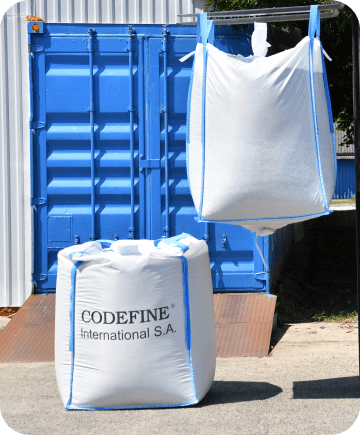Home » Posts Page » Blog » Ways To Recycle & Reuse FIBC Bulk Bags

Before every use, your bulk bag should be completely emptied and checked for signs of interior damage. You also need to carry out a full clean. If your bag includes a liner, remove this and replace it with a new one. Other elements, such as labels, web ties, and cord locks also need to be replaced if possible. Ultimately, your aim is to recondition the FIBC as much as possible. As soon as you spot any signs of wear and tear, it’s time to think about bulk bag recycling. Keeping a maintenance and usage log will also let you know when it’s time for FIBC recycling.
For further guidance on determining whether used FIBC bags are a viable option for your business, we recommend exploring our informative article that offers valuable insights into the advantages and considerations associated with their use.
If you want to do your part for the environment, FIBC recycling is important. As with any polypropylene product, bulk bags take a long time to decompose naturally. If FIBCs are simply sent to landfill, harmful contaminants can leach into the environment over many years. Furthermore, bulk bag recycling means less carbon and non-renewables are required to produce new FIBCs in the first place.

Many industries still rely on materials like cardboard for shipping and handling materials (for example Post & Parcel). Although these materials serve a purpose, they’re not particularly durable and are usually only suitable for single use.
If you’re looking for a more eco-friendly alternative, FIBCs are the way to go. The best bulk bags are designed for repeated use, keeping harmful chemicals out of landfill for longer. As well as being reusable, FIBC recycling means you can still commit to sustainability. You can find a wide range of options, such as bags for chemicals, and animal feed bags.

If you want to recycle bulk bags, you’ll first need to sort them and assign them a classification. An A-rating should be applied to relatively clean bags that still have their original color. Meanwhile, a B-rating should be applied to bags that are showing more visible signs of wear and tear.
Finally, use a C-rating for bulk bags that are in the worst condition. Once you’ve sorted bulk bags for FIBC recycling, you’ll need to sanitize them. A thorough cleaning will get rid of any remaining material.
Once a recycling facility receives your FIBCs, they’ll use a shredder to break the bags down into small flakes of plastic. Next, this shredded material will be separated based on size, shape, and color. At this point, any impurities will also be removed, rendering the material safe for recycling. These purified polymers can then be repurposed into usable material and used to manufacture new products.
Woven Polypropylene bulk bag recycling is fairly simple. Once your bags have reached the end of their life, they’re ready for collection or delivery to a repressing center. Bags are then sorted and cleaned to remove any harmful contaminants. As it’s the polypropylene that’s the target here, any additional elements like buttons and zippers are removed.
The remaining material is then shredded into flakes, before being moved to an extruder which melts the flakes at high heat. Eventually, these flakes condense to form small polypropylene granules. At this stage of the bulk plastic bag recycling process, unused polypropylene is often added to make the recycled material much stronger. The resultant material is then ready to be repurposed and create all manner of plastic products.
We hope you found this article informative and valuable, and we encourage you to visit our homepage to explore more about our FIBC solutions and discover how Codefine can assist you with recycling your FIBCs. We offer bags for different industries, such as the agricultural industry, or the construction industry. If you have any further questions or would like additional details, please don’t hesitate to reach out to your nearest Codefine representative.